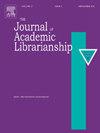学术图书馆中的人工智能——工具、合作者还是对手?波兰高校图书馆员的德尔菲研究
IF 2.3
3区 管理学
Q2 INFORMATION SCIENCE & LIBRARY SCIENCE
引用次数: 0
摘要
与许多其他机构一样,学术图书馆面临着与实施人工智能相关的机遇和威胁。这种技术的实际应用是由管理者根据他们的知识和经验来决定的,例如,通过引入今天很常见但曾经是创新的技术,如社交媒体。本研究的目的是了解波兰学术图书馆专家的意见和态度,这些意见和态度揭示了人工智能的潜在和可能的障碍。这种知识反过来又有助于建立能力和发展基于知识而不是偏见或陈规定型观念的积极态度。由于选择了人群,所以采用德尔菲法收集数据。对问卷陈述的回答进行定量分析,并采用主题叙事法对评论进行分析。研究结果显示,目前人们认为人工智能是一种工具,而不是图书馆工作的合作伙伴。他们还揭示了一些可能会对人工智能在图书馆的适应产生负面影响的担忧和信念。所获得的知识构成了关于在图书馆以及更广泛地在科学传播中实施人工智能过程的建议的基础。本文章由计算机程序翻译,如有差异,请以英文原文为准。
Artificial intelligence in academic libraries – a tool, a collaborator, an adversary? A Delphi study of university librarians in Poland
Like many other institutions, academic libraries face the opportunities and threats associated with implementing AI. The practical application of this technology is decided by managers based on their knowledge and experience, for example, by introducing technologies that are common today but were once innovative, such as social media. The aim of this study is to learn the opinions and attitudes of academic librarianship experts in Poland, which reveal the potential and possible barriers to AI. Such knowledge will, in turn, allow for the building of competencies and the development of positive attitudes based on knowledge rather than prejudice or stereotypes. Due to the selected population, the Delphi method was used to collect data. Quantitative analysis of responses to questionnaire statements was applied, and the thematic narrative method was used to analyze comments. The results show a realistic (as of the moment) perception of AI as a tool rather than a partner in library work. They also reveal certain concerns and beliefs that may negatively affect the adaptation of AI in libraries. The knowledge gained forms the basis for recommendations regarding the process of implementing AI in libraries and, more broadly, in scientific communication.
求助全文
通过发布文献求助,成功后即可免费获取论文全文。
去求助
来源期刊

Journal of Academic Librarianship
INFORMATION SCIENCE & LIBRARY SCIENCE-
CiteScore
5.30
自引率
15.40%
发文量
120
审稿时长
29 days
期刊介绍:
The Journal of Academic Librarianship, an international and refereed journal, publishes articles that focus on problems and issues germane to college and university libraries. JAL provides a forum for authors to present research findings and, where applicable, their practical applications and significance; analyze policies, practices, issues, and trends; speculate about the future of academic librarianship; present analytical bibliographic essays and philosophical treatises. JAL also brings to the attention of its readers information about hundreds of new and recently published books in library and information science, management, scholarly communication, and higher education. JAL, in addition, covers management and discipline-based software and information policy developments.
 求助内容:
求助内容: 应助结果提醒方式:
应助结果提醒方式:


